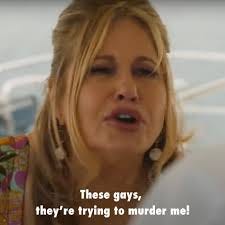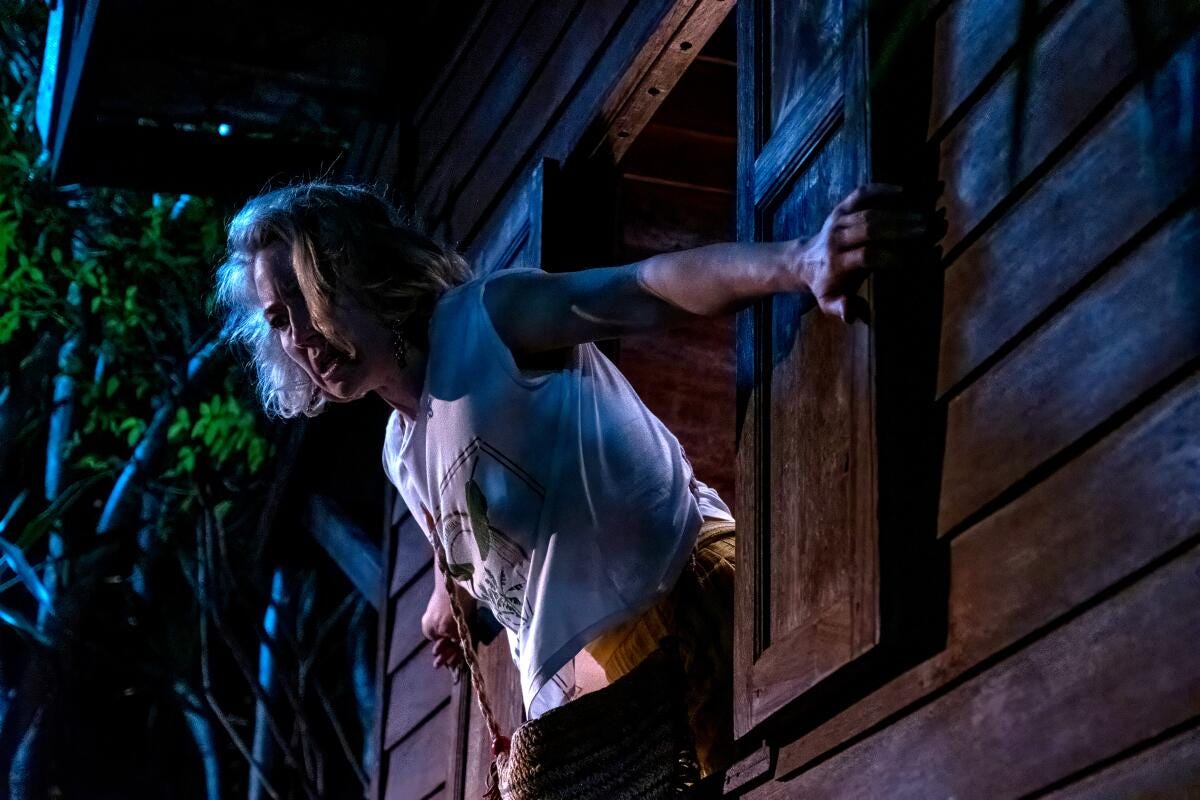White Lotus 3: Patriarchal Women and Buddhism
Why isn't anyone talking about the cringest part of this show? No, I'm not talking about Jaclyn and her friends.
Mike White must be the bravest creator in TV right now. I can’t think of any other show that has tackled with such relentlessness a theme that is extremely hard to talk about: the role of women in upholding the patriarchy.
Despite the slow start and the feeling that the characters White created for this season weren’t as strong as the previous ones, after careful consideration, I must say that this has probably become my favorite White Lotus season. Or at least the one that I found the deepest (I miss Jennifer Coolidge so much!).
This season set in Thailand tackles two themes that, in my opinion, are crucial if we want to have a thorough, honest discussion on the end of the patriarchy:
The role of women in upholding the patriarchy
The role of spirituality and religion in our society
A luxury resort is a peculiar observation point for gender dynamics: hotels that are incredibly expensive have an incredibly high percentage of heterosexual couples with high-net-worth men and their girlfriends/wives/families. Of course, the one paying for the vacation may be a woman (Laura Dern in Season 2), but it would be preposterous to claim that is the norm.
In many ways, White Lotus 3 is a “back to the norm” kind of season, and I found this choice extremely interesting. Donald Trump’s election, in fact, meant a huge push to eliminate references to LGBTQ+ people on government websites and, more generally, wherever. In this political and cultural climate, I found White’s choice to cut the non-binary storyline extremely smart.
What is more powerful than showing a bunch of “normal” people behaving in such abnormal ways? Parricide, incest, cross-dressing, attempted mass killing, the accidental killing of innocents, a very wise monk whose wisdom can’t rescue anyone… White Lotus 3 plays more like a Greek tragedy than a Netflix TV show. More than the previous ones, this reflects the seemingly inescapable misery of the human condition.
In season 3, part of this inescapable misery is conveyed through an incredibly controversial theme: Mike White insists very much on the pressure that many women put on men to be high earners and offer them the lifestyle that they want.
Timothy Ratliff learns early in the season that he is on the brink of losing his fortune, the fortune that allowed him to provide a luxurious lifestyle to his entire family. He starts contemplating suicide; then he starts trying to find evidence that his family would love him even if he can’t provide for them the same level of comfort. Heartbreakingly, no one, except his younger son, can comfort him. Everybody keeps telling him that they can’t see themselves living differently.
Chloe is adamant about the fact that her relationship with her older boyfriend Greg (Gary) is convenient for her and that she doesn’t want to give up on the chance to live the high life Greg is offering her. She never questions how Greg got that kind of money, and the matter appears to be of no interest to her.
Gaitok is a kind, spiritual man. He works a low-level security job at the gate of the resort, and he abhors violence. He wants to follow Buddha’s teachings, and he tells Mook about it. Mook, though, doesn’t care: if he wants to be with her, he must change his social status. So she pressures him into trying to impress his bosses to get a higher-paid, more socially prestigious job that Gaitok doesn’t want. By the end of the season, Gaitok gets the job after killing Rick.
Pornchai is another very positive character in the series. He is gentle and wise, and he wants to open a SPA with Belinda. The moment Belinda finds the money, by letting Greg buy her silence about the murder of his late wife, though, she leaves without an explanation.
In contrast, when Aleksei asks Laurie for money, inventing a story about his sick mother… she flees, literally jumping out of a window.
There are exceptions, of course: Chelsea is genuinely in love with Nick. She wants him to be better, and she doesn’t seem to care about anything else. She is unafraid to see him, good and bad, and she never stops trying to reach him in the depths of his dark loneliness. Their love story is the only one that seems real.
An extremely controversial issue
It’s tempting to dismiss these plot lines as veering into the territory of men’s rights activists, who often argue that “women only want men for their money.” But Mike White is far more subtle than that, and the show’s complexity undercuts any simplistic reading. It highlights that these characters are trapped in a larger system—one that values people primarily for their place in the social hierarchy - which, of course, is almost the extra character in each of the seasons of White Lotus, given the rigid distinction between guests and staff.
Women aren’t uniformly scheming or manipulative: they are navigating a patriarchal structure that often limits their choices, making financial security and social clout seemingly indispensable forms of survival and success.
This focus, in effect, forces us to grapple with an uncomfortable question: What kinds of pressure do women place on men, and what role does that pressure play in sustaining a system that places men at the top? The show’s portrayal suggests that, sometimes, women—and men—pursue traditional “power dynamics” not out of malice but because they have learned that deviation from these norms leads to punishment, ostracism, or hardship. Belinda’s opportunistic departure, Gaitok’s shift toward violence in order to ascend, Chloe’s blasé attitude about her boyfriend’s shady dealings—all these reflect how social, economic, and cultural incentives can lock people into reinforcing patriarchal norms.
Yes, we must be careful not to flatten these nuances into a talking point about “gold-diggers.” We need to address deeper questions of value, power, and access.
The role of spirituality
Could these characters choose independence and still thrive? How does spirituality, represented by Gaitok’s Buddhism, provide an alternative lens through which to live? The series seems to argue that the patriarchy will persist until these incentives change—until women (and men) can step outside prescribed roles without losing status, stability, or community.
Mike White seems to suggest that if patriarchy is the visible framework of social control in White Lotus—who has money, who must please whom—then spirituality is presented as a potential means of liberation. However, giving up on the patriarchal system of values is unbelievably hard, as Timothy’s daughter shows, when she gives up on her plan to stay for a year in a Buddhist monastery.
For a moment, it seems these characters might find real escape through enlightenment, meditation, or a genuine quest for the soul. But the tragedy is that the system often responds with brutal force. The ones who seek a new path find themselves literally extinguished.
In classic Greek tragedies, attempts to defy fate—whether driven by moral conviction, hubris, or desperation—usually end in the hero’s downfall. Here, Mike White echoes that structure: the more Chelsea and Lochlan long for spiritual depth, the harsher the system’s backlash. It’s a stark reminder of how patriarchy isn’t just a social or political structure—it’s an almost mythic force that resists change, sometimes violently.
Ultimately, White Lotus 3 is so impactful because it shows these dynamics in motion, rather than spelling them out in a lecture. It forces viewers to confront the tension between wanting liberation from the patriarchy and, simultaneously, benefiting from it in certain ways. By depicting these moral and emotional contradictions, Mike White dares us to question where our own unexamined loyalties lie—and whether, in the end, we, too, are inadvertently keeping the old structures alive.
So… is it all pointless?
I don’t believe it is. Our lives are intertwined in such unpredictable ways that we have to come to terms with the fact that we can’t control the outcome of our actions. We can only control our actions. Pursuing spiritual fulfillment is not a guarantee that we will have a beautiful life or that we’ll be pain-free.
However, showing up with each other more fully and making space in our hearts for the yearning for something more meaningful can bring us closer to the essence of life.
After all, if we truly are water drops on our way to the ocean—united with the whole—experiencing glimpses of unity before we get there might just be the most beautiful way we have to be alive.
Stellar Stories for Boys of the Future is OUT! It’s the first collection of original fairytales offering kids a healthier, more wholesome perspective on what it means to become a man. Order it on Amazon, or in your favorite bookstore. If you ordered the book and you liked it, please, review it on Goodreads or Amazon!










